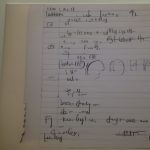22 Study Hacks to Get You Ready for the Fall Semester

If you’re like us, you actually enjoy mining for study hacks as the semester draws ever closer. It’s a time of renewal and excitement where the possibilities are endless. Learning as much as you can about how to do your best now will make it easier to enact later. In that vein, we’ve put together 22 study hacks that we think will make your coming semester a lot easier. Take what makes sense, and leave the rest!
1. Create Calendar Reminders for Each Class
Create reminders early in the school year – like, as soon as you get your schedule – so that you’ll know what to expect each day. You can do this on a print calendar, though you might want to stick with a smartphone since it makes it much easier to repeat reminders without having to write each one out by hand. You also might consider taking a picture of your schedule and saving it as the lock screen on your phone.
2. Start a Handwritten To-Do List
We’ve always been big proponents of traditional handwriting. It creates a triangle of connection from brain to hand to paper and back again. You don’t just see things and scroll past them. You think about their complexities and nuance. When using handwriting to create your to-do list, it’s easier to sequence the things that need to get done and cement those tasks in your head for the day, week, or month. Furthermore, create a new to-do list every day or two so you’re always staying on top of those high-priority items.

3. Designate a Study Area
Your college library is a great place to start. If you haven’t swung by to check it out yet, make a campus visit with that on the top of your list. If libraries aren’t your thing, find a great coffee shop or bookstore where you can relax and use the WiFi if needed. You can also work in your dorm room or off-campus apartment/house/duplex if that’s more to your liking.
4. Make Homework a Part of Your Day
When we say to make homework a part of your day, we mean to work it into the to-do list. Treat it like you would your classes. You don’t get to do anything else until it gets done. Addressing homework right away gives you a better ability to retain key concepts and information.
5. Spend a Lot of Time Thinking
Ernest Hemingway once characterized his work life as long periods of thinking followed by short periods of writing. The human brain is one of the most amazing computers to exist, especially when coming up with its own study hacks. It can work out so much without being in front of a computer or notepad. If you have a major project, presentation, or test coming up, take the time necessary to really focus on what needs to get done. It will prepare you to do the actual work faster.
6. And Less Time Working
Parkinson’s Law states that a task will grow to fit the amount of time you’ve allotted for it. If you have 7 hours to do a one-hour assignment, you can actually end up making that assignment last the full 7 hours. If you’re handling the thinking business in No. 5, you won’t have any problem here. Just be mindful of the things we do to expand the true amount of time it takes to accomplish something.
7. Know What Distracts You
Are you a video gamer? A chronic Netflix-and-Chiller? Maybe a good book knocks you off-course. Be careful of all the cool toys and distractions existing in your living space. Also, avoid locations that easily pull you away from deep work. If you know the easiest methods of distraction, you’ll be able to schedule your time and location to avoid them.
8. Make Time for Breaks During Study Sessions
It’s okay to schedule three- and four-hour study sessions, but don’t think you’re going to be studying the whole time. At least, you’d better not be if you hope to stay productive and receptive to what you’re supposed to be learning. You can recharge your brain by making time for walks and refreshments. These study hacks take no longer than 10-15 minutes for every 45-50 minutes of focused study time. That’s really all you’ll need to stay on track.
9. Pause for Notes
Watching YouTube videos that teach you a key concept or how to work a specific type of math problem? Reading a book that demystifies the topic? Perhaps you’re really into educational podcasts that shine lights on career paths and related subject areas.
Whatever study hacks you’re doing to increase your understanding of a topic, pause when something jumps out at you and make a handwritten note. You can do this in a notebook or on the margins of a book (that you own obviously). Making notes while something is really resonating will ensure that the info or concept is cemented in your head.
10. Focus On Concepts
The Feynman method has long been one of the best tools for remembering key concepts and filling in the gaps of your understanding. The Feynman Technique is a philosophy that says if you can’t explain something to a six-year-old, then you really don’t understand it yourself. The Feynman method is based on the idea that if you want to learn something, you should teach it to someone else.
Here’s how it works: (1) reread the same material several times; (2) create a diagram of the information; (3) ask yourself questions about the material before, during, and after reading it.
The Feynman Technique is among our top study hacks because it is an approach to problem-solving that works by breaking a larger problem into smaller pieces. It’s based on the idea that the best way to solve a complicated problem is to break it down into smaller, simpler problems.
11. Make Plans
The rewards system works great among the different study hacks available to you for getting your study on as well, but you need to make the most of those rewards at a certain point. Like, say, a beach vacation or road trip if you ace a project or meet your target grade for the semester in a class.
The act of making plans for how you will reward yourself keeps you motivated as you set out to achieve an educational goal. Furthermore, it ensures you don’t get distracted by smaller rewards or pleasantries along the way. Small rewards too often have a way of causing you to settle. Keeping your eyes on the bigger prize and creating a plan for achieving those bigger prizes will keep your head in the right space.
12. Avoid Cramming
When you cram, you might retain information long enough to pass a test. However, you’re likely to leak that information in time and set yourself further back from attaining your educational objectives. If you make room for quality study time each day, then you won’t have to cram, and you’ll feel more at-ease with the material.
13. Create Playlists Base On Productivity
Yes, the new death metal album or EP might be your cup of tea for rocking out, but it’s not going to get you closer to understanding complex concepts. For that, you need to divorce yourself from your favorite type of music and find an appreciation for the kind that better stimulates your brain. Good playlists will always top our list of study hacks because they help your mind focus without breaking the flow of thought.
14. Simulate and Rehearse
If you have a major exam coming up, one of the study hacks you should be using is to simulate the exam conditions. This will make it much easier to keep your nerves in check when the actual test day comes. Likewise, for presentations, you should rehearse multiple times before appearing in front of your peers and professor for the actual “performance.”
15. Use Any Study Resources You Can
You have more options than you probably realize to “right the ship” when you don’t understand something. Obviously, there are the online resources like videos and websites. But you can also benefit from tutoring programs at your school, taking advantage of your professors’ office hours, or heading over to the Dean’s office for any of the on-site student tutors. Some colleges and universities even have more fully developed tutoring programs that can help you get back on track. Be aware of where those resources are from day one, and never hesitate to use them. It’s what the astronomical tuition rates (partially) go towards.
16. Treat Study Groups As Study Groups
You aren’t there to be social. You’re there to help each other understand what you are trying to master for the class you are targeting. If it’s too difficult getting started or making sure everyone’s at the right place on time, put the project management tools at your disposal to good use. Record study sessions to share with group members who can’t be there, or send in some of your findings when you have to miss. Stay goal-focused, and you’ll avoid wasting study group time.
17. Compare You to You
Stop chasing the Joneses. Just be the best You that you can be. Compete against yourself each day.
18. Prepare the Night Before
Regardless of whether it’s a project, presentation, or exam that you have to be ready for, go over the obligations ahead of you the night before. Make sure all your materials are handy and ready to grab as you walk out the door. If those resources are available digitally, download what you can so they’ll be accessible even if there’s a problem with the WiFi.
19. Isolate Your Phone While Studying
Our phones command more and more of our attention as time goes on. They’re energy vampires. The longer you go without curbing the addiction, the harder it will be to kick. When it comes time to study, place your phone somewhere where it is not easily heard or accessible. Human beings got along just fine before the advent of the smartphone. It can be set down for 45 minutes so you can plow through a study session, and the world won’t stop turning.
20. Use Visual and Textual Aids Appropriately
There is a time for visual and textual learning. Fortunately, there are tools for it, too. Mind-mapping is one of the most popular study hacks among visual learners. It consists of drawing balloons or shapes with one idea or piece of information inside. You then draw more as they come to you and connect them all together.
Textual learning aids are useful as well, particularly when it comes time to write a paper and structure your ideas. For this, the flat outline is worth adopting.
21. Constantly Back Up Study Materials, Resources, and Work
Nothing will break your spirit faster than failing to back up your work and losing it all. Whatever the case, whether it’s something you’ve created or something that was emailed to you from an external source, save it somewhere where it’s easy to access and easily described.
For print materials, take pictures and use the notes application on your phone to organize them by folders and subfolders. The more you have available digitally, the easier it will be to access them from any device and at any time.
22. Make Time for Wellness
Wellness is something that you should latch onto early in your educational career. It consists of eating the right foods and making time to exercise. Without at least one of these two components, it’s impossible to lead a healthy life. Yes, you might be able to control your weight and fat intake by careful dieting and no exercise. But it’s easy to add exercise to the rotation if you find something you actually enjoy doing.
If you think you’re not good at anything, scratch that negative thinking at once. You can start where you are, no matter how low impact it is, and gradually increase what you do as you get used to the process and improve your health metrics. Taking the time to improve your wellness will ensure your brain lives up to its maximum potential.
These Study Hacks Will Set You Up for Success
We hope you will consider the study hacks we’ve shared with you as you move into the late summer and early fall months. Let’s make this coming year a great one by preparing to be and do our best ahead of time.
[Featured Image by Flickr Creative Commons]








